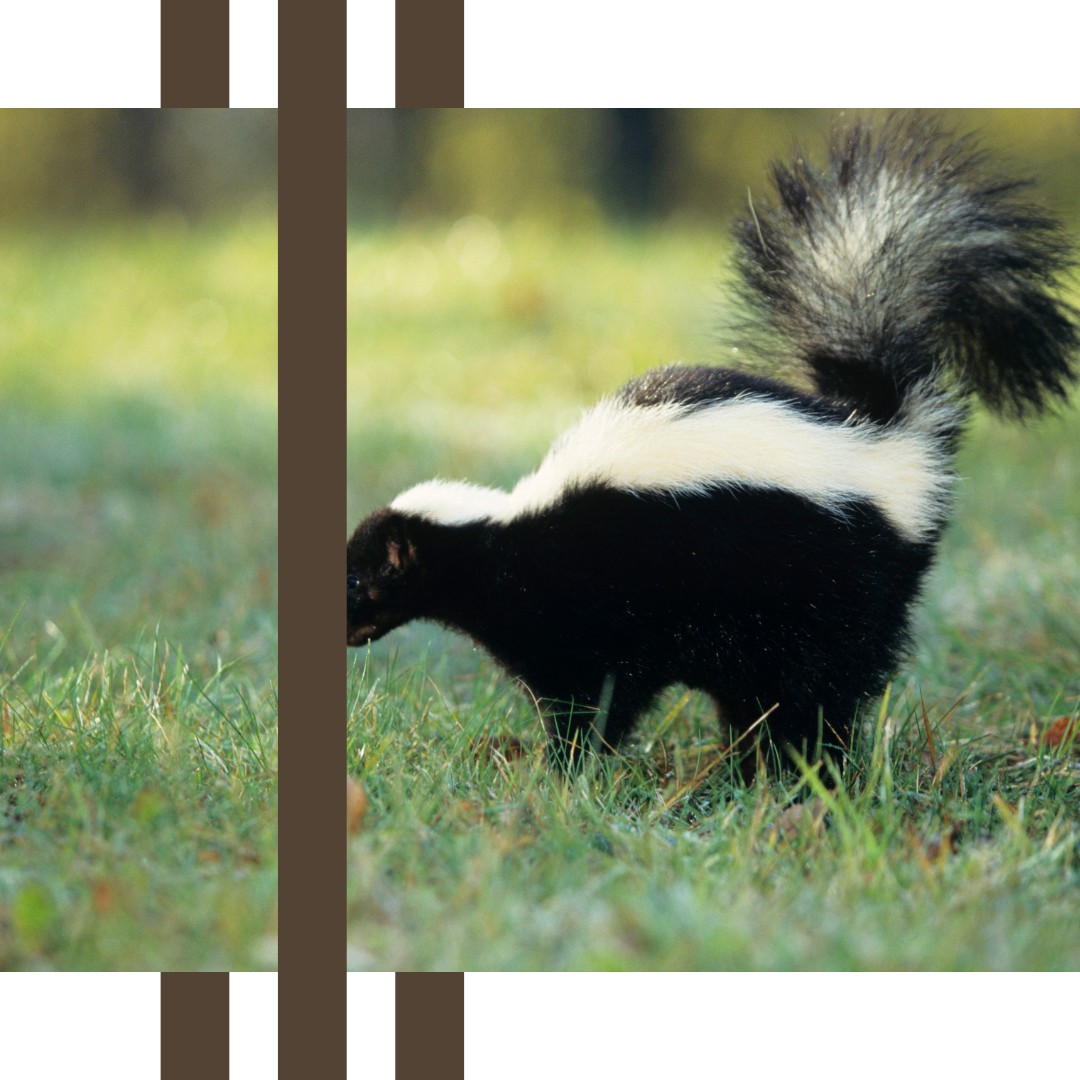
Skunk Removal & Control
Central Iowa is primarily home to two types of skunk: the striped and the spotted skunk. Striped ones are easier to recognize due to their black fur with white stripes running from head to tail. Spotted ones, as the name suggests, have white spots mixed in with their black fur. Although their appearance is different, both types are experts at digging, and their burrows can cause considerable damage to your property.
The Havoc The Wreak
So, what kind of headaches can these stinkers stir up for you? For starters, their strong, foul-smelling spray can be quite off-putting, to say the least. The spray isn’t just unpleasant; it can also be hard to remove and could stick around for days. They are also prone to rummaging through garbage cans in search of food, scattering waste all over the place. Apart from the mess they create, their burrowing habits can compromise the structural integrity of your buildings, decks, and even driveways.
Skunks can carry diseases like rabies, putting your family and pets at risk. And let’s not forget, their food scavenging often attracts other pests, causing an even larger issue. The problems are myriad, from property damage to health risks, making their control a necessity.
Did you know that the spray emitted by skunks can reach up to 20 feet? Or that a mother can give birth to as many as ten kits in a single litter? Removal by experts resulted in a more than 90% success rate in preventing a return of the nuisance, compared to less than 50% with DIY methods.
Getting Rid Of Skunks
While the Do-It-Yourself approach works for many tasks around the house, dealing with this particular animal is another story altogether. Trapping or cornering them might lead to them releasing their notorious spray as a defense mechanism, which could be a messy and smelly affair to clean up. Additionally, mishandling can lead to bites or scratches that could transmit diseases. Another point to consider is that state and local laws often have specific guidelines for the humane removal of wildlife, and non-compliance can result in penalties.
Backwater Wildlife Solutions is your trusted partner in ensuring a nuisance-free environment. We abide by all state and local regulations and employ humane and effective techniques for animal removal. Our trained experts use state-of-the-art equipment and have a thorough understanding of animal behavior, ensuring a swift and safe resolution to your problem. Contact us today to schedule your free consultation. With Backwater Wildlife Solutions, you’re not just getting a service; you're investing in a lasting solution.
Frequently Asked Skunk Questions
Q1. Can Skunks Interfere with My Composting Activities?
A1. If you're an eco-conscious homeowner who engages in composting kitchen waste, you may find that skunks take an unsolicited interest in your compost pile. While composting is an excellent way to recycle organic matter, the aroma of decomposing food can attract these animals to your backyard. Their rummaging not only disrupts the composting process but can also spread decomposing waste around the area, causing both a mess and potential health hazards. Therefore, if you're noticing disruption in your compost pile or even just a lingering foul smell, it might be time to consult Backwater Wildlife Solutions for professional assistance.
Q2. Do Ultrasonic Repellents Work on Skunks?
A2. Ultrasonic repellents have been touted as a non-intrusive means to keep pests away from homes and gardens. However, their effectiveness on these particular nuisances is subject to debate. The frequencies emitted by ultrasonic devices may not be sufficient to deter them from entering your property, and some may even become acclimated to the noise over time. So, if you've tried ultrasonic repellents without success, it may be more effective to opt for professional services like those offered by Backwater Wildlife Solutions.
Q3. Can Skunks Pose a Problem for Livestock on My Property?
A3. While skunks are generally not directly harmful to larger livestock such as cows and horses, they can still pose an indirect risk. They are known carriers of parasites like ticks and fleas, which can transfer from them to livestock, causing potential health issues. The holes they dig around barnyards and pastures can be hazardous, leading to injuries from animals tripping or stepping into them. Their strong odor can also create an unpleasant environment in closed spaces like barns, making it uncomfortable for both livestock and humans. If you're a livestock owner and notice signs of these pests, it's wise to call in experts from Backwater Wildlife Solutions to assess and manage the situation effectively.
All Rights Reserved | Backwater Wildlife Control

